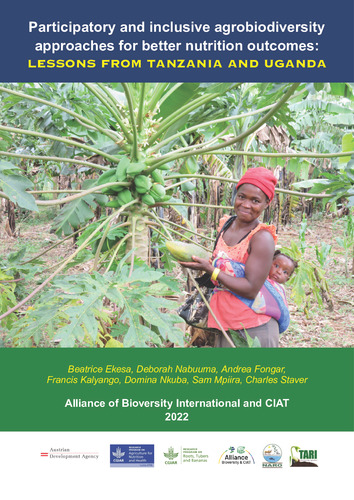Participatory and inclusive agrobiodiversity approaches for better nutrition outcomes: Lessons from Tanzania and Uganda
Abstract
Integrated and complementary approaches in sectors such as the food system, agriculture, and public health are important in the alleviation of food insecurity and malnutrition. Smallholder farming households are a vulnerable group that continue to face food insecurity, malnutrition, poverty, and are also pivotal to food production in developing countries. Gender and nutrition are intrinsically linked, for example, women are disproportionately affected by malnutrition. Through participatory experimentation with rural smallholder farming households in Bukoba, Tanzania and Kiboga, Uganda to increase agrobiodiversity-based production and dietary options for infants and young children and local learning alliances for stakeholder engagement and capacity building, the following were realised:
• Participatory identification and selection of agrobiodiversity options contributed to their adoption in the farming systems. Promotion of agrobiodiversity and provision of seed was backed by training and support visits facilitated adoption and utilisation.
• Increase in dietary diversity at the household- and child-levels, especially an increase in DGLV and vitamin A-rich roots and tubers. This was supported by adoption and utilisation of the agrobiodiversity options by households, capacity building, and a showcase of the link between child diet, health, and growth to the farmers.
• Use of a household approach that integrated both men and women led to increased engagement of men throughout the project from providing support to the participating wives, participating in thematic meetings and child growth monitoring, management and/or supportive decision making regarding the agrobiodiversity options.

